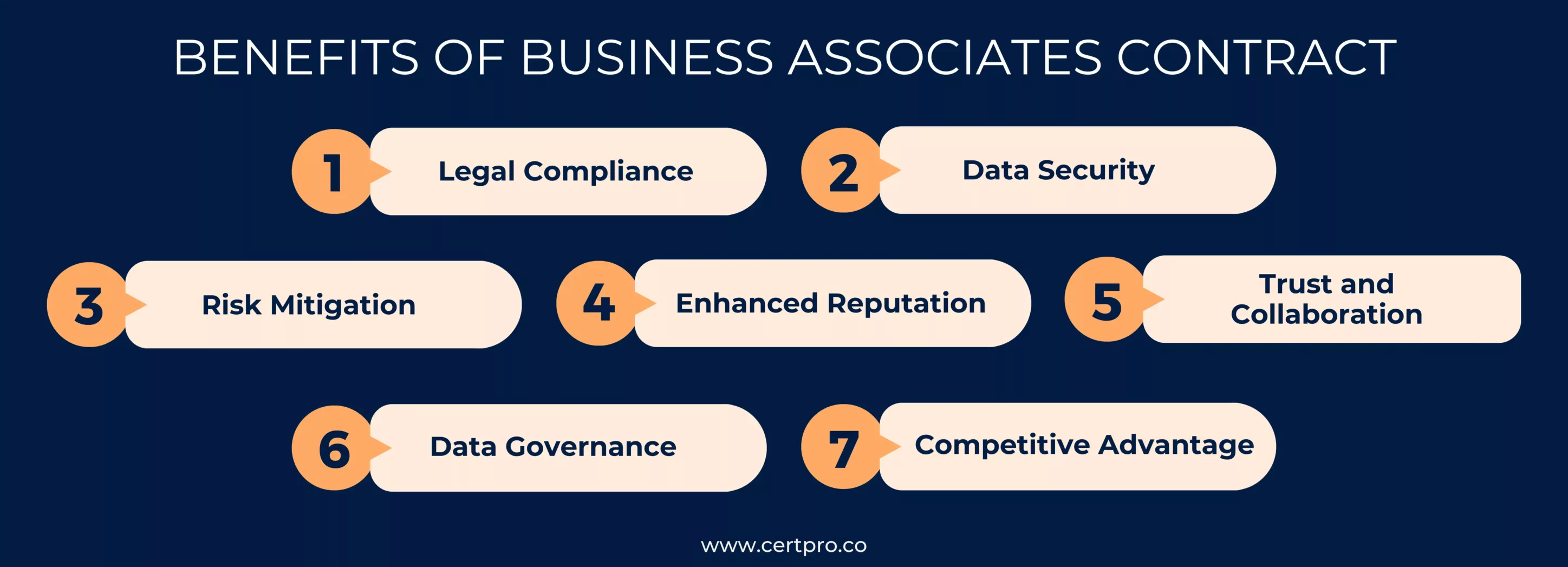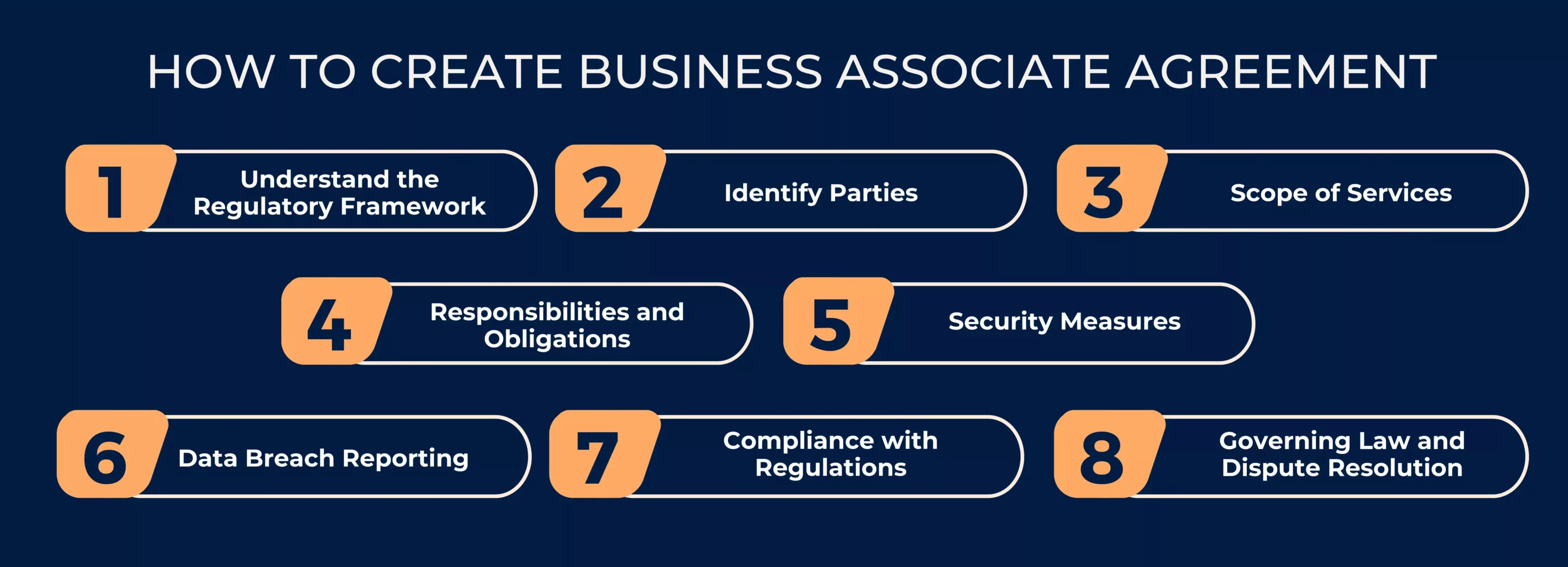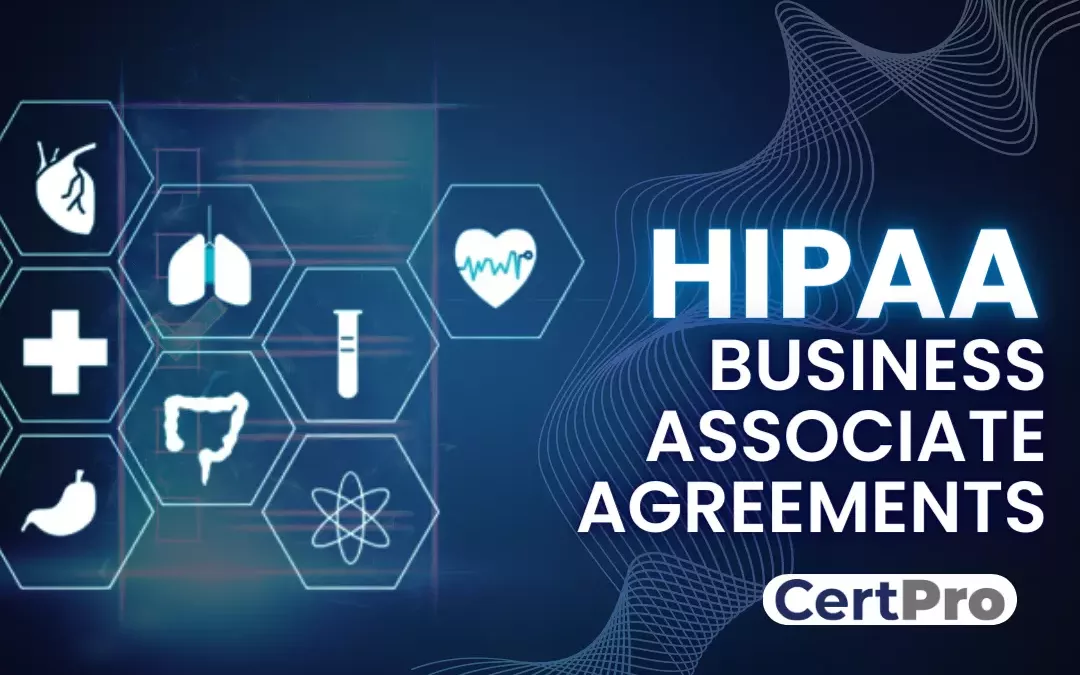In today’s data-driven business environment, good handling of sensitive information is critical. HIPAA Business Associate Agreements (BAAs) have evolved as critical legal instruments for defining obligations and responsibilities when exchanging or handling sensitive data, particularly in regulated industries such as healthcare and finance. A BAC is a legally enforceable contract between a firm and a third-party service provider (business associate) outlining how the associate will manage, secure, and use the data entrusted to them.
These are critical to data security, privacy, and regulatory compliance. Not only do they define the extent and purpose of data access, but they also require security measures, incident response strategies, and data breach notification standards. By formalizing these arrangements, Business Associate Contracts encourage transparency and accountability, lowering the risks of data breaches, unlawful access, or mistreatment; they promote confidence among parties and help maintain the general integrity of corporate operations.
This article delves into the complexities of those Contracts, exploring their significance, key components, and broader impact on safeguarding sensitive data in a digitally interconnected world. Understanding the variation of BACs is crucial for companies seeking to uphold data privacy standards, maintain legal compliance, and cultivate secure collaborations in today’s evolving business landscape.
WHAT is a hipaa BUSINESS ASSOCIATE AGREEMENT?
It outlines the specific responsibilities and requirements of both parties. Covered entities are typically responsible for sharing the necessary PHI with the business associate for their services, while business associates are obligated to use the information only as agreed upon, implement appropriate security measures, and report any breaches.The US Department of Health and Human Services (HHS) defines a “business associate” as a person or entity that performs certain functions or activities on behalf of or provides services to a covered entity that involve the use or disclosure of protected health information. A Business Associate Contract, also known as a A Business Associate Agreement is a formal written contract established between two entities. This agreement delineates the specific obligations of each party with respect to Protected Health Information (PHI).
The primary purpose of a HIPAA Business Associate Agreement is to ensure that business associates who have access to PHI maintain its confidentiality, integrity, and availability. This is essential to complying with data protection regulations like Business Associate HIPAA, which mandate safeguarding PHI and disclosing it only when necessary.
Parties Involved in BAA are:
- Covered Entity (CE): This is typically an organization that collects, creates, or maintains PHI. It can be a healthcare provider, a health plan, or a healthcare clearinghouse.
- Business Associate (BA): A business associate is a third-party individual or organization that performs services on behalf of the covered entity that involve the use or disclosure of PHI.
BAAs are critical tools for maintaining the privacy and security of sensitive data, fostering trust between covered entities and business associates, and ensuring compliance with relevant data protection regulations.
BENEFITS OF BUSINESS ASSOCIATES CONTRACT
Some key benefits of implementing BAAs include:
1. Legal Compliance: One of the primary benefits of BAAs is ensuring compliance with data protection regulations. In sectors like healthcare, BAAs help organizations adhere to regulations such as Business Associate HIPAA.
2. Data Security: It mandates stringent security measures that business associates must implement to safeguard sensitive data. These measures include encryption, access controls, regular security audits, and incident response plans.
3. Risk Mitigation: It helps mitigate the risks associated with data breaches and unauthorized access. By defining responsibilities and expectations, BAAs create a structured framework that reduces the likelihood of mishandling data.
4. Enhanced Reputation: In an era where data privacy breaches can severely damage an organization’s reputation, having strong BAAs demonstrates a commitment to safeguarding sensitive information.
5. Trust and Collaboration: It facilitates partnerships with third-party service providers by ensuring that sensitive information is handled responsibly. Businesses can confidently collaborate with business associates, knowing that the agreement mandates compliance with security and privacy standards.
6. Data Governance: By setting guidelines for data access, usage, and disclosure, It contributes to better data governance. This structured approach encourages organizations to define and enforce data management practices consistently.
7. Competitive Advantage: Organizations that can demonstrate robust data protection practices through BAAs gain a competitive advantage. Clients and partners are more likely to trust companies that take data security seriously, leading to increased business opportunities.
In conclusion, Business Associate contracts go beyond mere legal requirements, offering a comprehensive framework for data security, risk mitigation, collaboration, and regulatory compliance.

HOW TO CREATE BUSINESS ASSOCIATE AGREEMENT?
Creating a robust and legally sound HIPAA Business Associate Agreement (BAA) involves several key steps to ensure that the agreement effectively outlines the responsibilities, obligations, and compliance requirements of both parties. It involves careful consideration of legal and compliance requirements.
Here’s a step-by-step guide on how to create a HIPAA Business Associate Agreement:
1. Understand the Regulatory Framework: Familiarize yourself with the applicable regulations, such as parties, in the healthcare sector. Understand the requirements and standards that need to be addressed in the BAA.
2. Identify Parties: Clearly identify the covered entity (your organization) and the business associate. Include their legal names, addresses, and contact details.
3. Scope of Services: Define the services or functions for which the business associate will handle Protected Health Information (PHI). Outline the purpose and context of PHI use.
4. Responsibilities and Obligations:Clearly specify the responsibilities and obligations of both parties. Include provisions for data security, privacy, and compliance with regulations.
5. Security Measures:Detail the specific security measures the business associate will implement to protect PHI. This could include encryption, access controls, and regular security assessments.
6. Data Breach Reporting:Define procedures for reporting data breaches or security incidents. Include timelines and required information for reporting.
7. Compliance with Regulations:Include a statement confirming the commitment of both parties to comply with relevant regulations, such as HIPAA.
8. Governing Law and Dispute Resolution:State the governing law applicable to the agreement and outline the methods for resolving disputes.
Remember that the specifics of your BAA may vary based on your industry, applicable regulations, and the nature of the services involving PHI. Creating a comprehensive and compliant BAA is essential to ensuring data protection and legal adherence while fostering trust between the parties involved.

EXCEPTIONS PROVIDED BY HIPAA TO BAA STANDARDS
While the Health Insurance Portability and Accountability Act (HIPAA) mandates that covered entities and their business associates must enter into Business Associate Agreements (BAAs) for the protection of Protected Health Information (PHI), there are certain exceptions to this requirement.
These exceptions include:
- Disclosure for Treatment, Payment, and Healthcare Operations (TPO):In some cases, PHI can be shared between covered entities and business associates without a HIPAA Business Associate Agreement. This is when The disclosure is for treatment, payment, or healthcare operations purposes, and the PHI is used within the scope of these functions.
- Legal requirement: If the law requires the disclosure of PHI without a BAA, organizations may waive the requirement for a BAA. However, this exception is narrowly interpreted, and organizations should ensure they meet the specific legal criteria.
- Personal Representatives: If an individual’s personal representative (such as a parent or legal guardian) is authorized to access PHI, a HIPAA Business Associate Agreement may not be required.
- Healthcare Provider-to-Healthcare Provider Communication: PHI can be shared between healthcare providers for purposes of treatment without a BAA. This communication typically involves exchanging patient information to ensure proper care.
- Disclosure to a Healthcare Oversight Agency: When PHI is disclosed to a healthcare oversight agency for regulatory compliance or investigation purposes, a BAA might not be required.
- Disclosure to the Individual:Covered entities may share an individual’s PHI with the individual themselves without requiring a BAA. This includes providing copies of medical records to patients.
It’s important to note that while these exceptions exist, organizations should exercise caution and ensure that the disclosure of PHI without a BAA falls clearly within the parameters defined by the regulations.
MANAGING DATA SECURITY THROUGH BUSINESS ASSOCIATE AGREEMENTS
The emergence of HIPAA Business Associate Agreements (BAAs) has marked a pivotal shift in how organizations approach data handling and exchange, particularly in regulated sectors like healthcare and finance. BAAs stand as legal safeguards that delineate roles and responsibilities when managing crucial data, fostering accountability and compliance in an interconnected world.
Business Associate Agreements serve as linchpins of data security, privacy, and regulatory adherence. They transcend mere documentation by specifying the extent of data access, enforcing security measures, and setting forth protocols for incident response and breach notifications. By formalizing these agreements, transparency and responsibility are elevated, curbing the risks of data breaches, unauthorized access, and misuse.
The multifaceted world of Business Associate Agreements is a testament to their significance. These agreements not only ensure compliance with data protection regulations but also empower organizations to stand at the forefront of data security.
FAQ
WHY IS BAAS IMPORTANT?
BAAs ensure data security, privacy, and regulatory compliance in industries like healthcare. They define PHI access, require security measures, and set breach response standards, fostering trust and accountability.
WHO NEEDS A BAA?
Covered entities and their business associates, such as healthcare providers and vendors, need BAAs when PHI is shared. Exceptions apply in certain cases, like treatment and legal mandates.
ARE THERE EXCEPTIONS TO BAA REQUIREMENTS?
Yes, Business Associate HIPAA provides exceptions for disclosures involving treatment, legal requirements, personal representatives, healthcare providers, oversight agencies, and individual disclosures.
HOW WAS BAAS CREATED?
Creating a HIPAA Business Associate Agreement involves understanding regulations, identifying parties, defining services, specifying responsibilities, addressing security measures, reporting breaches, and ensuring legal review.
WHAT IS THE IMPACT OF BAAS?
BAAs foster accountability, integrity, and trust in data handling. They enhance security practices, protect sensitive information, and lay the foundation for responsible collaborations in a data-driven world.

About the Author
SHREYAS SHASTHA DRUPADHA
Shreyas Shastha Drupadha, a Senior Business Consultant. Serving as an ISO 27001 Lead Auditor, Shreyas ensures the establishment of robust information security management systems. His expertise also encompasses GDPR, HIPAA, CCPA, and PIPEDA implementation.
HITECH ACT AND ITS IMPACT ON MODERN HEALTHCARE
In 2009, the Health Information Technology for Economic and Clinical Health or HITECH Act was signed to transform the American healthcare industry. The laws worked as a forward-thinking process of changing patient services. In this regard, the Patient Protection and...
BEST PRACTICES FOR DATA PROTECTION IN THE HEALTHCARE INDUSTRIES
In the healthcare sector, safeguarding sensitive information about patients is extremely important. Patient data includes personal details, medical histories, and treatment plans. Therefore, it must be protected and should be confidential. Thus, breaches not only...
HIPAA CONSULTANTS: WE KNOW HOW TO SECURE YOUR INFORMATION
Navigating HIPAA compliance can be complex; therefore, organizations seek advice from HIPAA consultants. These HIPAA experts have specific knowledge. They can help firms to understand the problematic standards of the Healthcare Privacy Act. In 1996, HIPAA was created....




